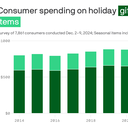This 28-year-old went from summer intern to McKinsey partner in 7 years. This is what helped him progress.
McKinsey
- 28-year-old Aamanh Sehdev was named a McKinsey partner this December.
- After joining as a summer intern, he's climbed the ranks in just seven years.
- Sehdev spoke to BI about how he heard the news and what helped him progress at McKinsey.
Aamanh Sehdev had spent a week in early December trying to distract himself by seeing friends and playing padel.
He'd been an associate partner for two of his seven-year career at McKinsey and knew there was a chance he'd be promoted to partner.
But there was a low number of elections this year, so he thought it was fifty-fifty.
The news usually arrives at the end of the week. But at around 8:30 p.m. on Wednesday, Sehdev received a call at home. It was from Tunde Olanrewaju, managing partner of McKinsey's UK, Ireland, and Israel offices.
"The nerves were kicking in, but he got straight to the point," Sehdev told Business Insider.
"Hey, it's great news. Welcome to the partnership. We're really excited to have you on board," Sehdev recalled Olanrewaju telling him. "I said thanks, but in a slightly higher pitch voice than I typically have."
Sehdev is one of around 200 McKinsey employees promoted to partner this December. Amid a slowdown in demand for consulting services, this year's cohort is one of the firm's smallest in recent years.
The promotion elevates him to one of the most senior positions you can reach in a major consulting firm. Partnerships are participatory, giving individuals a say in the direction of the firm. Those promoted to equity partners receive a share of the annual profits.
Leon Neal/Getty Images
On McKinsey's website, partners are described as "not only meeting McKinsey's high bar for exceptional leadership, but they are also dedicated to finding solutions to some of the world's most pressing challenges."
At 28, Sehdev is one of the youngest in the cohort. He spoke to BI about what it was like to receive the news and what it takes to make partner.
'Enjoy the moment'
Although his call with Olanrewaju lasted only a few minutes, Sehdev spent the next hour and a half on the phone with sponsors and mentors.
"Obviously, there was a lot of excitement, a lot of congratulations, and a bit of a common thread of 'let it sink in, don't rush into the next thing, enjoy the moment,'" he said.
He also called his mother and brother that evening. His parents didn't go to university, so it was a major milestone for the family. "They were super proud and excited," he said. "They've obviously been pretty key in shaping my journey."
But the following morning, it was into the office to carry on as usual and keep the news a secret from his colleagues until McKinsey's formal announcement a week and a half later.
Sehdev said he was still digesting the achievement. In the new year, he's taking a 17-day trip to Australia to "carve out a little bit of time to think about it a bit more formulaically."
His first focus is to switch off and get some sun, he added.
Aamanh Sehdev
Becoming a partner is notoriously difficult and competitive. It's the ultimate goal for many consultants starting their careers.
Not for Sehdev.
When he began studying mechanical engineering at London's Imperial College, Sehdev had never heard of McKinsey.
"It was something that people around me were talking about alongside banking," he told BI. "I turned up to a career fair, it was interesting, and I applied for the internship."
For the first half of his career, Sehdev said he was doing "a bit of a random walk" through a whole host of sectors and different functions. It helped him find the right home at the firm — he now works on a combination of private capital and McKinsey's telecommunications (TMT) practice.
Sehdev acknowledged that seven years was a fast ascent up the ranks, but said that meritocracy was one of McKinsey's benefits.
"What McKinsey has a tendency to do is when you get comfortable, they take you to the next role or level, and then you get uncomfortable again. That snowballed for me over the last seven years."
Sehdev said three reasons he was selected as a partner came through in his evaluation.
First, he always has a focused strategy for what he's doing and what he wants to do next at the firm. Second, he showed entrepreneurship and originality, particularly when it came to creating novel ways to work with the smaller software businesses he concentrates on. Lastly, he invested time with the teams and created a positive, energizing atmosphere.
There's an element of luck involved in it as well, he added, saying he was fortunate to have met managers early on who would stay late in the evenings to teach him.
No matter how good you are, working at a top consultancy can be intense. Sehdev said he carves out time to exercise, spend time with family, and protect his weekends. He doesn't expect that to change now he's a partner.
"My mindset has always been, look, I'll set a really high bar, but I'll not let the micro-events or little things take away too much energy. That's made me better at my job."

